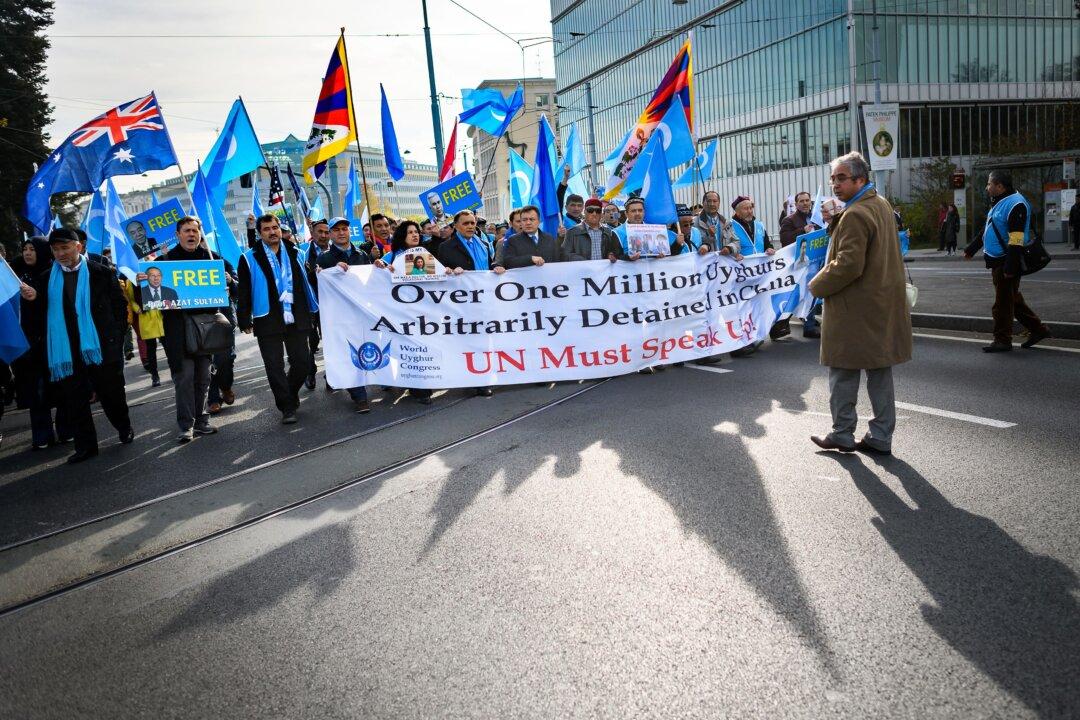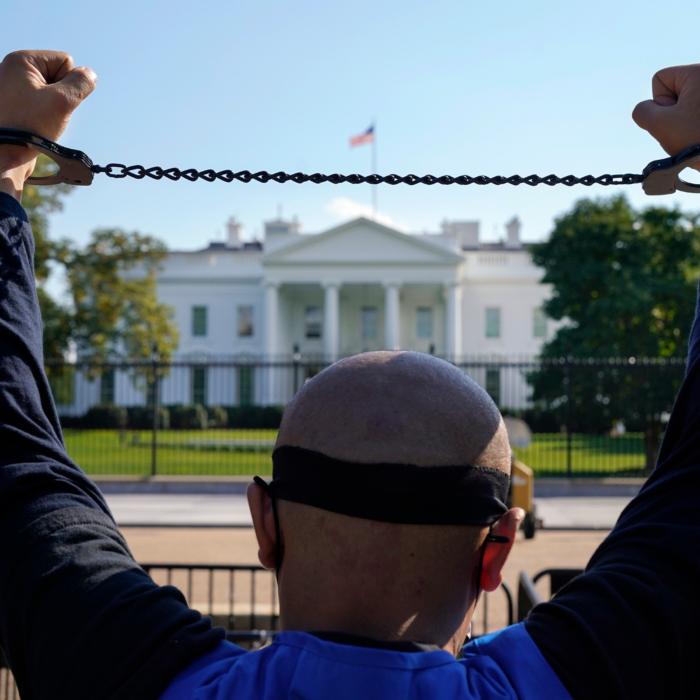While the United Nations was convening its 78th General Assembly on Manhattan’s Upper East Side with an address from President Joe Biden on Sept. 19, another forum was gathered in Midtown’s St. Regis Hotel.
That group noted that in the year since the international body concluded that the Chinese Communist Party (CCP) may be engaging in “crimes against humanity” against Uyghurs and other Muslim Turkic peoples, nothing has happened.
Nothing, that is, except continued reports of those crimes, according to forum speakers.
“You know, I think the stories about Xinjiang have faded a little from the headlines or from the front pages. Despite all of the different policies and proposals and speeches, it has slipped down a little bit as a political priority,” said Gady Epstein, senior editor at The Economist.
The event was organized by the Atlantic Council’s Strategic Litigation Project, Human Rights Watch, and Amnesty International.
Human rights and Uyghur rights advocacy groups have criticized the U.N. for failing to take concrete action to hold China accountable for documented abuses.

This report concluded that CCP policies targeting Uyghurs and other Turkic communities in China’s Xinjiang region “may constitute international crimes, in particular crimes against humanity.”
“The UN’s report was a necessary wake-up call to the international community, but the on-the-ground reality of mass imprisonment, forced labor, family separations, and suppression of Uyghur language, culture, religion, and identity shows that there is still much the international community needs to do to stop the ongoing atrocities, reunite families with their loved ones, and reject the Chinese government’s impunity to commit crimes against humanity,” the project stated.
Rayhan Asat, a Uyghur human rights lawyer and nonresident senior fellow at The Atlantic Council, said, “It is a tragedy that what brings us together is a pressing need for international action against the Chinese government’s relentless abuses of Uyghurs and other target communities.”
Ms. Asat’s brother has been “suffering in a concentration camp since he was unjustly detained in 2016.”
“China has robbed us of today’s months and years of being with our loved ones through mass detention, imprisonment, lengthy sentences, and a separation,” she said.
CCP Objected to Discussion
Although various governments sent representatives to the discussion—including the United States, which sent U.S. Ambassador-at-Large for Global Criminal Justice Beth van Schaack—there was little official U.N. representation. Still, the CCP was apparently interested in the event.The CCP warned U.N. member states to not attend the discussion in a Sept. 14 statement issued by China’s U.N. mission, referring to the event’s three cosponsor nonprofits as “notorious anti-China organizations” that are interfering in China’s internal affairs that the CCP says are geared to economic development and vocational skills training for Uyghurs.
“They are obsessed with fabricating lies and spreading malicious disinformation about Xinjiang with no respect for truth, and are plotting to use human rights issues as a political tool to undermine Xinjiang’s stability and disrupt China’s peaceful development,” China’s U.N. mission stated.
Peter Loeffelhardt, chief of the German Federal Foreign Office Directorate for Asia and the Pacific Division, dismissed the CCP’s claims “with one obvious central reminder: Human rights are universal, indivisible, interdependent, and interrelated; they are not subject to a hierarchy and cannot be separated from other topics.”
“It is a false and dangerous narrative to say that human rights is ‘an obstacle’ to development,” he said.
“Human Rights always need to be part of the discussion. When we address human rights violations, bilaterally and multilaterally, it is not an interference in internal affairs.”
The CCP’s alleged human rights violations don’t end at China’s shores, Mr. Loeffelhardt said. Ms. Asat confirmed that with personal testimony.
‘China’s Long-Arm Reach’
Ms. Asat said she’s one of those victims’ activists “walking on a tightrope” advocating for Uyghurs while being harassed by the CCP in the United States.“Even Americans living in America are still subject to China’s long-arm reach. What they are using is our families, our loved ones, their lives—they’re literally keeping them as a hostage,” she said.
“[Chinese officials] let you hear your loved one’s voice for a second, and you know, they’re alive. So then you must be watching your actions for what comes next.”
This type of “transnational repression, international repression beyond its borders” doesn’t qualify for the U.N.’s current definition of human rights violations, Ms. Asat said.
“It’s very depressing but outrageous that none of that meets the definition of any international norms and laws that China has breached,” she said.
“So, I think, there has to be a discussion about codifying these kinds of state actions that are taking place outside their borders as transnational repression and making it part of the international system of accountability.”
Speaking for the United States, Ms. Van Schaack said: “Notwithstanding [the CCP’s] continued attempts to intimidate and to silence those speaking out on human rights with yet another example of a global campaign of transnational repression, I’m also pleased to see that their efforts have only increased international scrutiny on the situation within Xinjiang, and particularly the atrocities against the Uyghur people.
“Now, while it remains very challenging to create pathways to justice for [the CCP’s] atrocities in Xinjiang, the high commissioner’s assessment does offer a solid foundation for further action, so we must not stand idly by or be silent or bound to China’s pressure to simply look away.
“The United States has chosen to name these atrocities as they should be—as genocide and as crimes against humanity. And as they continue, the world must stand firm against them in both word and deed.”
Waving a copy of the Chinese U.N. mission’s Sept. 14 “do not attend” letter, Human Rights Watch China Director Sophie Richardson said, “Any government that’s going to go out of its way to bother doing this, first of all, has no business sitting on the UN Human Rights Council.
“But also, [the letter is] essentially confirming that [China] has got a lot to hide and it knows it. Part of our purpose, our job, is to keep holding and defending this space until Uyghurs can do it themselves at home.”







